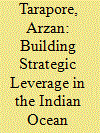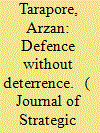|
|
|
Sort Order |
|
|
|
Items / Page
|
|
|
|
|
|
|
| Srl | Item |
| 1 |
ID:
179391


|
|
|
|
|
| Summary/Abstract |
Over the past decade, China has established a permanent and escalating military presence in the Indian Ocean region. The littoral states, islands, and waters of the Indian Ocean—defined here by the choke points of the Cape of Good Hope, Bab el-Mandeb, the Strait of Hormuz, the Malacca Strait, and the Torres Strait—are part of the wider Indo-Pacific region, but they constitute a distinct strategic landscape. The United States’ strategic competition with China does extend to the Indian Ocean region, but it does not take the same form as the heavily militarized territorial disputes of the western rim of the Pacific Ocean or the South China Sea, which attract the lion’s share of attention from US policymakers and military planners. The Indian Ocean faces a particular set of strategic risks and a particular constellation of likeminded partners—an effective strategy must account for those particularities.
|
|
|
|
|
|
|
|
|
|
|
|
|
|
|
|
| 2 |
ID:
189429


|
|
|
|
|
| Summary/Abstract |
Why does combat success sometimes fail to produce a stable and durable post-war settlement? In the 1965 war, India successfully defended against a Pakistani invasion, but did not improve the long-term security of Kashmir or establish deterrence against Pakistan. I argue that, to deter rivals after war, states must couple battlefield success with credible signals of resolve, such as retaining captured territory or risking a wider war. In 1965, India used both denial and punishment strategies, but both failed to establish post-war deterrence because it judged the necessary signals of resolve to be too costly.
|
|
|
|
|
|
|
|
|
|
|
|
|
|
|
|
| 3 |
ID:
153995


|
|
|
|
|
| Summary/Abstract |
As a matter of policy, Washington has in recent years encouraged India to take a greater role in regional security. After years of warming bilateral relations, in 2009 then-Secretary of Defense Robert Gates announced that the United States would “look to India to be a partner and net provider of security in the Indian Ocean and beyond.”
|
|
|
|
|
|
|
|
|
|
|
|
|
|
|
|
| 4 |
ID:
189098


|
|
|
|
|
| Summary/Abstract |
When a state faces a rising great power rival, it has a range of balancing options from which to choose. But a balancing state may consider many of the most common options to be either too costly or unduly provocative. Thus India, for example, considered 2020 to be a strategic watershed—with a clearly more aggressive China on the border, and a clearly more disorderly international system after the COVID pandemic—but has undertaken only modest military balancing. What alternative options do such erstwhile balancers have? This article addresses both those theoretical and empirical puzzles, by introducing the novel concept of ‘zone balancing’ as another option in a balancing state's repertoire. Zone balancing seeks to shape the international field of competition in which the balancer and rival operate—specifically, to build the capacity and resilience of third-party states, to shrink the rival's ability to coerce them. This article advances that concept and uses it to explain India's post-2020 strategic adjustment, and especially its warmer embrace of the Quad—the minilateral grouping comprising Australia, India, Japan and the United States. Zone balancing effectively explains the Quad's recently-clarified strategic logic, and predicts some of its limitations.
|
|
|
|
|
|
|
|
|
|
|
|
|
|
|
|
|
|
|
|
|